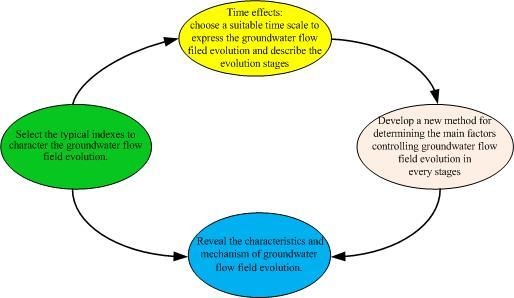An Approach to Study Groundwater Flow Field Evolution Time Scale Effects and Mechanisms
Abstract
1. Introduction
2. Materials and Methods
2.1. Study Areas
2.2. Data
2.3. Research on Scale Effect
2.4. Dominant Factor Analysis
2.5. Quantitative Analysis
3. Results
3.1. Scale Effect and Stage Division of the Evolution of the Groundwater Flow Field
3.2. Characteristics of Groundwater Flow Field Evolution
3.3. Analysis of Dominant Factors
3.4. Quantitative Analysis of Influence of Precipitation and Exploitation on Groundwater Levels
4. Discussion
5. Conclusions
Author Contributions
Funding
Acknowledgments
Conflicts of Interest
References
- Murphy, J.M.; Sexton, D.M.H.; Jenkins, G.J. UK Climate Projections Science Report: Climate Change Projections; Met Office Hadley Centre: Exeter, UK, 2009. [Google Scholar]
- Xu, Y.Q.; Mo, X.G.; Cai, Y.L.; Li, X.B. Analysis on groundwater table drawdown by land use and the quest for sustainable water use in the Hebei Plain in China. Agric. Water Manag. 2005, 75, 38–53. [Google Scholar] [CrossRef]
- Perrina, J.; Ferrant, S.; Massuel, S.; Dewandel, B.; Maréchal, C.; Aulong, S.; Ahmed, S. Assessing water availability in a semi-arid watershed of southern India using a semi-distributed model. J. Hydrol. 2012, 460–461, 143–145. [Google Scholar] [CrossRef]
- Wang, W.S.; Ding, J.; Li, Y.Q. Hydrogeology Wavelet Analysis; Chemical Industry Press: Beijing, China, 2005. [Google Scholar]
- Nalley, D.; Adamowski, J.; Khalil, B. Using discrete wavelet transforms to analyze trends in stream flow and precipitation in Quebec and Ontario (1954–2008). J. Hydrol. 2012, 475, 204–228. [Google Scholar] [CrossRef]
- Parkin, G.; Birkinshaw, S.J.; Younger, P.L.; Rao, Z.; Kirk, S. A numerical modeling and neural network approach to estimate the impact of groundwater abstractions on river flows. J. Hydrol. 2007, 339, 15–28. [Google Scholar] [CrossRef]
- Padilla, F.; Méndez, A.; Fernández, R.; Vellando, P.R. Numerical modeling of surface water/groundwater flows for freshwater/saltwater hydrology: The case of the alluvial coastal aquifer of the Low Guadalhorce River, Malaga, Spain. Environ. Geol. 2008, 55, 215–226. [Google Scholar] [CrossRef]
- Yidana, S.M.; Alfa, B.; Banoeng-Yakubo, B.; Addai, M.O. Simulation of groundwater flow in a crystalline rock aquifer system in Southern Ghana—An evaluation of the effects of increased groundwater abstraction on the aquifers using a transient groundwater flow model. Hydrol. Process. 2012, 28, 1084–1094. [Google Scholar] [CrossRef]
- Iwasaki, Y.; Nakamura, K.; Horino, H.; Kawashima, S. Assessment of factors influencing groundwater—Level change using groundwater flow simulation, considering vertical infiltration from rice—Planted and crop-rotated paddy fields in Japan. Hydrogeol. J. 2014, 22, 1184–1855. [Google Scholar] [CrossRef]
- Lafare, A.E.A.; Peach, D.E.; Hughes, A.G. Use of seasonal trend decomposition to understand groundwater behavior in the Permo—Triassic Sandstone aquifer, Eden Valley, UK. Hydrogeol. J. 2016, 24, 141–158. [Google Scholar] [CrossRef]
- Asmuth, J.R.; Maas, K.; Bakker, M.; Petersen, J. Modeling Time Series of Groundwater Head Fluctuations Subjected to Multiple Stresses. Groundwater 2008, 46, 30–40. [Google Scholar] [CrossRef]
- Bloomfield, J.P.; Marchant, B.P. Analysis of groundwater drought building on the standardized precipitation index approach. Hydrol. Earth Syst. Sci. 2013, 17, 4769–4787. [Google Scholar] [CrossRef]
- Chae, G.T.; Yun, S.T.; Kim, D.S.; Kim, K.H.; Joo, Y. Time—Series analysis of three years of groundwater level data (Seoul, South Korea) to characterize urban groundwater recharge. Q. J. Eng. Geol. Hydrogeol. 2010, 43, 117–127. [Google Scholar] [CrossRef]
- Wang, W.S.; Yuan, P.; Ding, J. Wavelet analysis and its application to stochastic simulation of daily flow. J. Hydraul. Eng. 2000, 11, 43–48. (In Chinese) [Google Scholar]
- Kang, L.; Liu, S.R.; Liu, X.Z. Multiresolution and periodicity analysis of hydrological and meteorological factors in upper reaches of Minjiang River. Acta Ecol. Sin. 2016, 36, 1253–1262. (In Chinese) [Google Scholar]
- Zhang, G.H.; Fei, Y.H.; Zhang, X.N.; Yan, M.J. Abnormal variation of groundwater flow field in plain area of Hutuo River basin and analysis on its cause. J. Hydraul. Eng. 2008, 39, 747–752. (In Chinese) [Google Scholar]
- Yang, Y.H.; Watanabe, M.; Sakura, Y.; Tang, C.Y.; Hayashi, S. Groundwater table and recharge changes in the Piedmont region of Taihang Mountain in Gaocheng City and its relation to agricultural water use. Water SA 2002, 28, 171–178. [Google Scholar] [CrossRef]
- Kendy, E.; Zhang, Y.Q.; Liu, C.M.; Wang, J.X.; Steenhuis, T. Groundwater recharge from irrigated cropland in the North China Plain: Case study of Luancheng County, Hebei Province, 1949–2000. Hydrol. Process. 2004, 18, 2289–2302. [Google Scholar] [CrossRef]
- Shu, Y.Q.; Villholth, K.G.; Jensen, K.H.; Stisen, S.; Lei, Y. Integrated hydrological modeling of the North China Plain: Options for sustainable groundwater use in the alluvial plain of Mt. Taihang. J. Hydrol. 2012, 464–465, 79–93. [Google Scholar] [CrossRef]
- Du, S.H.; Su, X.S.; Lu, H. The Artificial Recharge Effects of Groundwater Reservoir under Different Precipitation Plentiful Scanty Encounter in Hutuo River. J. Jilin Univ. (Earth Sci. Ed.) 2010, 40, 1090–1097. (In Chinese) [Google Scholar]
- Nakayama, T.; Yang, Y.H.; Watanabe, M.; Zhang, X.Y. Simulation of groundwater dynamics in the North China Plain by coupled hydrology and agricultural models. Hydrol. Process. 2006, 20, 3441–3466. [Google Scholar] [CrossRef]
- Hu, Y.K.; Moiwo, J.P.; Yang, Y.H.; Han, S.M.; Yang, Y.M. Agricultural water saving and sustainable groundwater management in Shijiazhuang Irrigation District, North China Plain. J. Hydrol. 2010, 393, 219–232. [Google Scholar] [CrossRef]
- Zhang, G.H.; Fei, Y.H.; Nie, Z.L.; Yan, M.J. Theory and Method of Regional Groundwater Flow Field Evolution and Assessment; Sciences Press: Beijing, China, 2014. [Google Scholar]
- Zhang, Z.J. Investigation and Assessment of Sustainable Utilization of Groundwater Resources in North China Plain; Geological Publishing House: Beijing, China, 2009; pp. 157–180. ISBN 978-7-116-06105-7. [Google Scholar]
- Geological Environmental Monitoring Institute of Hebei Province (GEMIHP). Report on Geological Environmental Monitoring of Shijiazhuang of 1981–1985, 1986–1990, 1991–1995, 1996–2000, 2001–2005, 2006–2010. Available online: www.ngac.cn/125cms/c/qggnew/index.htm (accessed on 17 August 2018).
- GEMIHP. Yearbook of Shijiazhuang Groundwater Level Statistical of 1961–1980. Available online: www.ngac.cn/125cms/c/qggnew/index.htm (accessed on 17 August 2018).
- Wang, J.Z.; Zhang, G.H.; Yan, M.J.; Nie, Z.L. Research on the Plot Groundwater spatial-temporal Evolvement Rule in Hutuo Valley. J. Arid Land Resour. Environ. 2009, 23, 5–11. (In Chinese) [Google Scholar]
- Mao, X.S.; Liu, C.M. Groundwater changing trends and agriculture sustainable development in Taihang mountain foot Plain of North China. Res. Soil Water Conserv. 2001, 8, 147–149. (In Chinese) [Google Scholar]
- Liu, Z.P. Impact of Agricultural Activities on Regional Groundwater Variation—A Case of Shijiazhuang Plain. Ph.D. Thesis, Chinese Academy of Geological Sciences, Beijing, China, 2007. [Google Scholar]
- Fei, Y.H. The influence of Huangbizhuang reservoir dam foundation seepage cut-off on the downstream development and counter measures. Site Investig. Sci. Technol. 1996, 6, 13–15. (In Chinese) [Google Scholar]
- He, P. Primary Analysis of Groundwater Circumstances Influence of Huangbizhuang Village Reservoir Water proof Project to the Hutuo River Alluvium. Ground Water 2009, 31, 121–123. (In Chinese) [Google Scholar]
- Jarvis, A.; Reuter, H.I.; Nelson, A.; Guevara, E. Hole-Filled Seamless SRTM DataV4. International Center for Tropical Agriculture. Available online: http://srtm.csi.cgiar.org (accessed on 17 August 2018).
- Sang, Y.F.; Wang, D. Wavelet selection method in hydrologic series wavelet analysis. J. Hydraul. Eng. 2008, 39, 295–300. (In Chinese) [Google Scholar]
- Zhang, J.; Zhang, L.C.; Xu, C.M.; Zhang, J.Z.; Li, X.B. Application of fuzzy consistent matrix method in multi-objective decision plain of slim hole drilling. Nat. Gas Ind. 2003, 23, 61–62. (In Chinese) [Google Scholar]
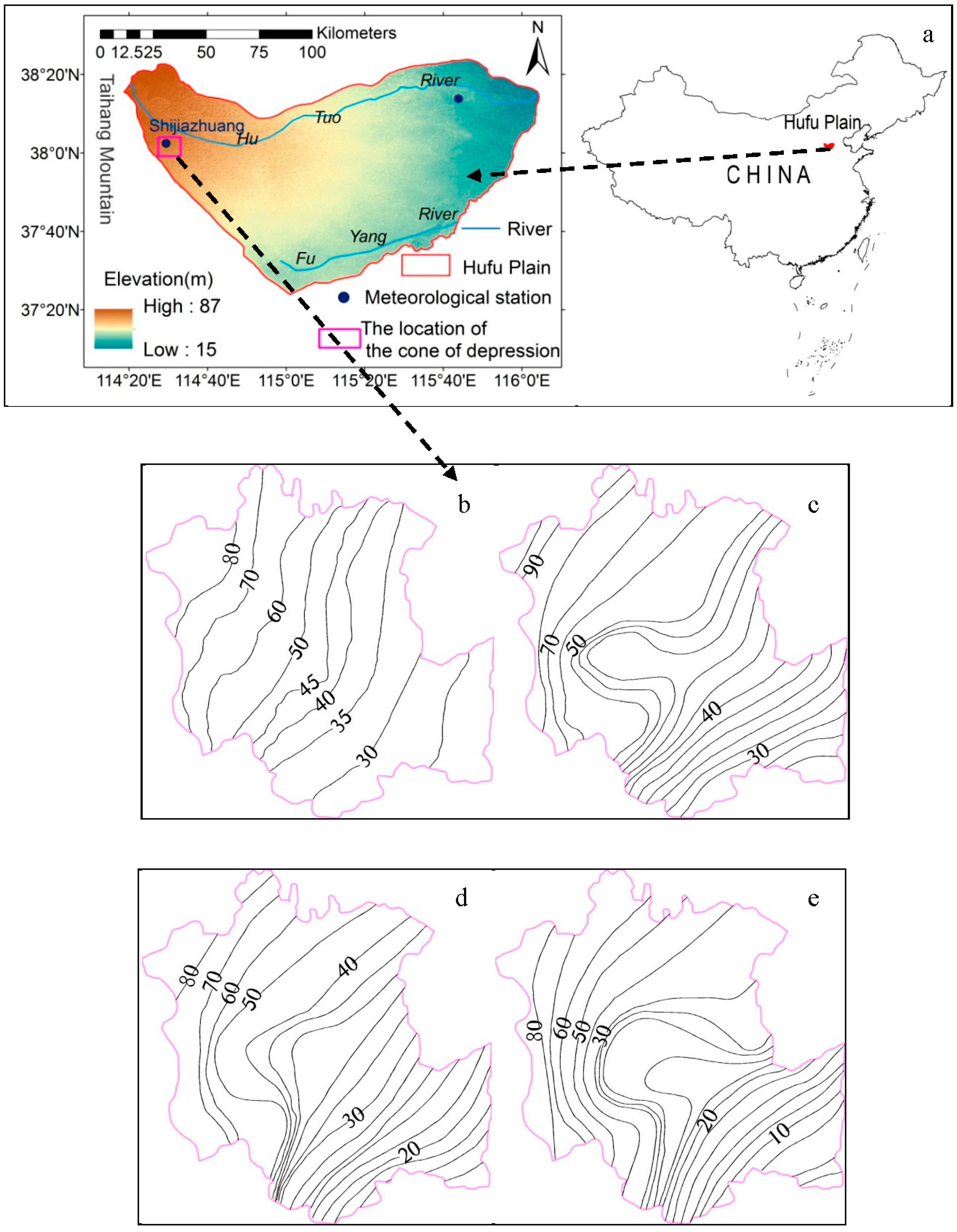
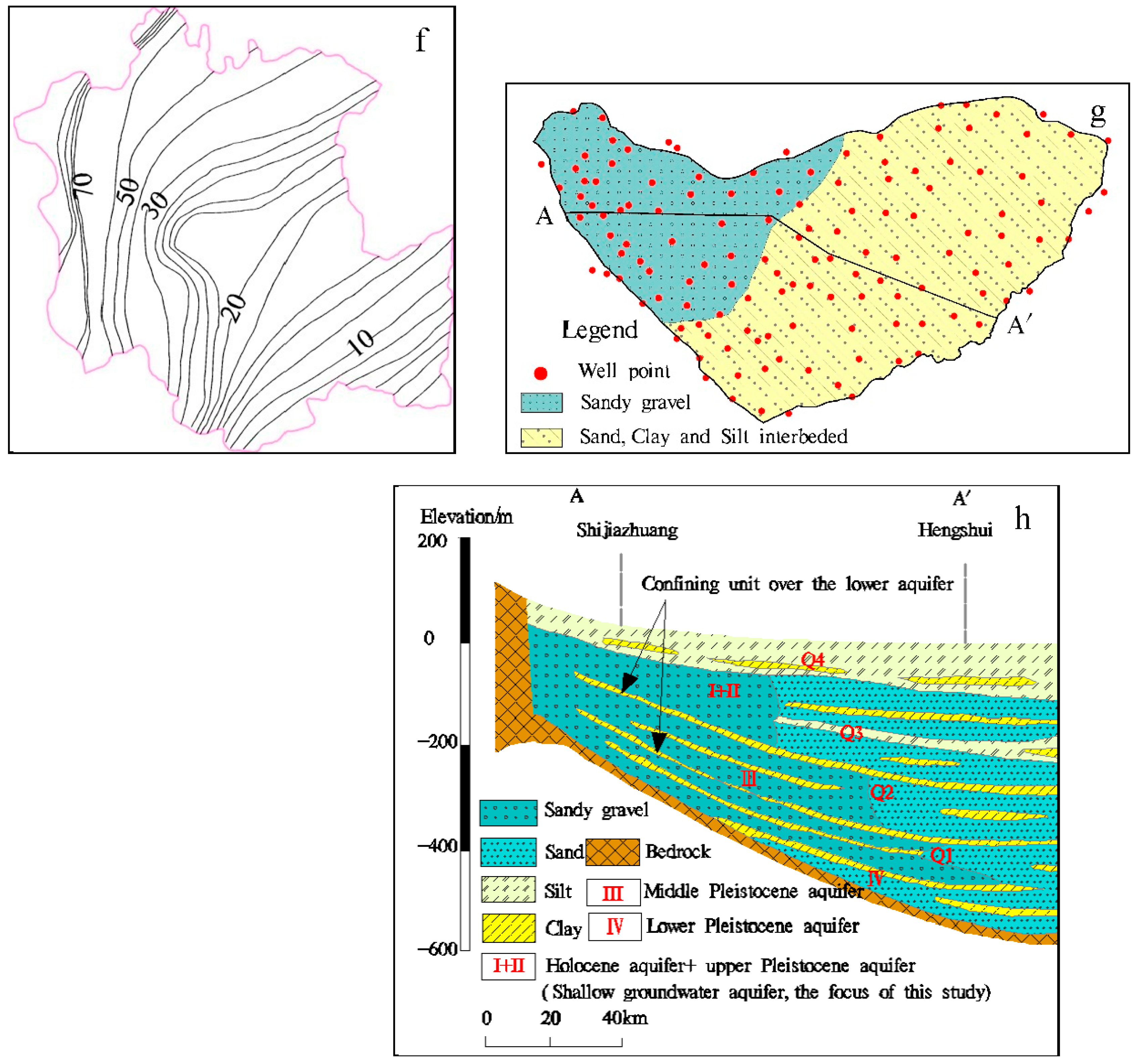
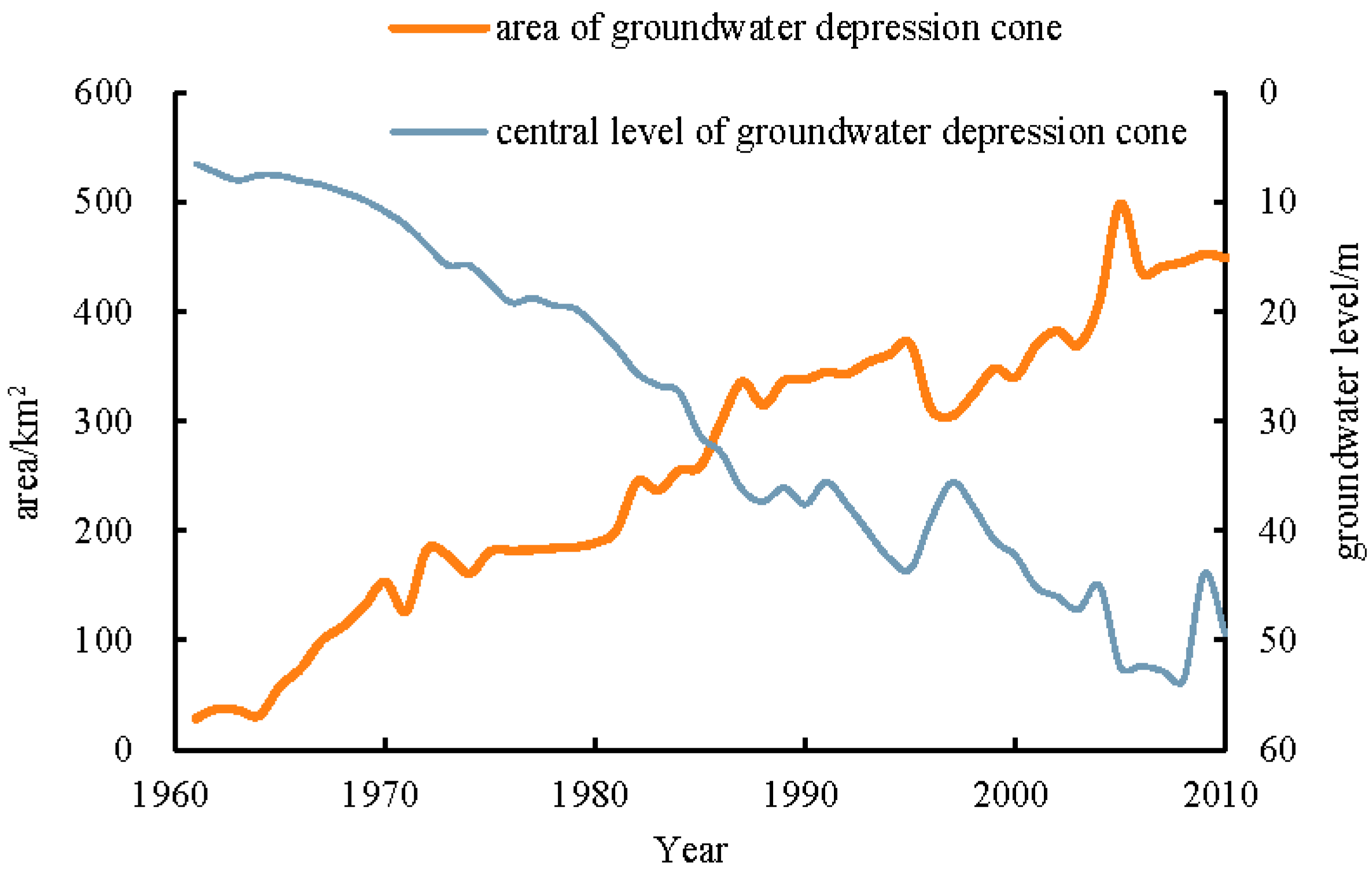
 indicates the transition points, and the labels provide the F test values between the division sequences linear regression model slope, * indicates significance levels of 0.05, ** indicates significance levels of 0.01.
indicates the transition points, and the labels provide the F test values between the division sequences linear regression model slope, * indicates significance levels of 0.05, ** indicates significance levels of 0.01.
 indicates the transition points, and the labels provide the F test values between the division sequences linear regression model slope, * indicates significance levels of 0.05, ** indicates significance levels of 0.01.
indicates the transition points, and the labels provide the F test values between the division sequences linear regression model slope, * indicates significance levels of 0.05, ** indicates significance levels of 0.01.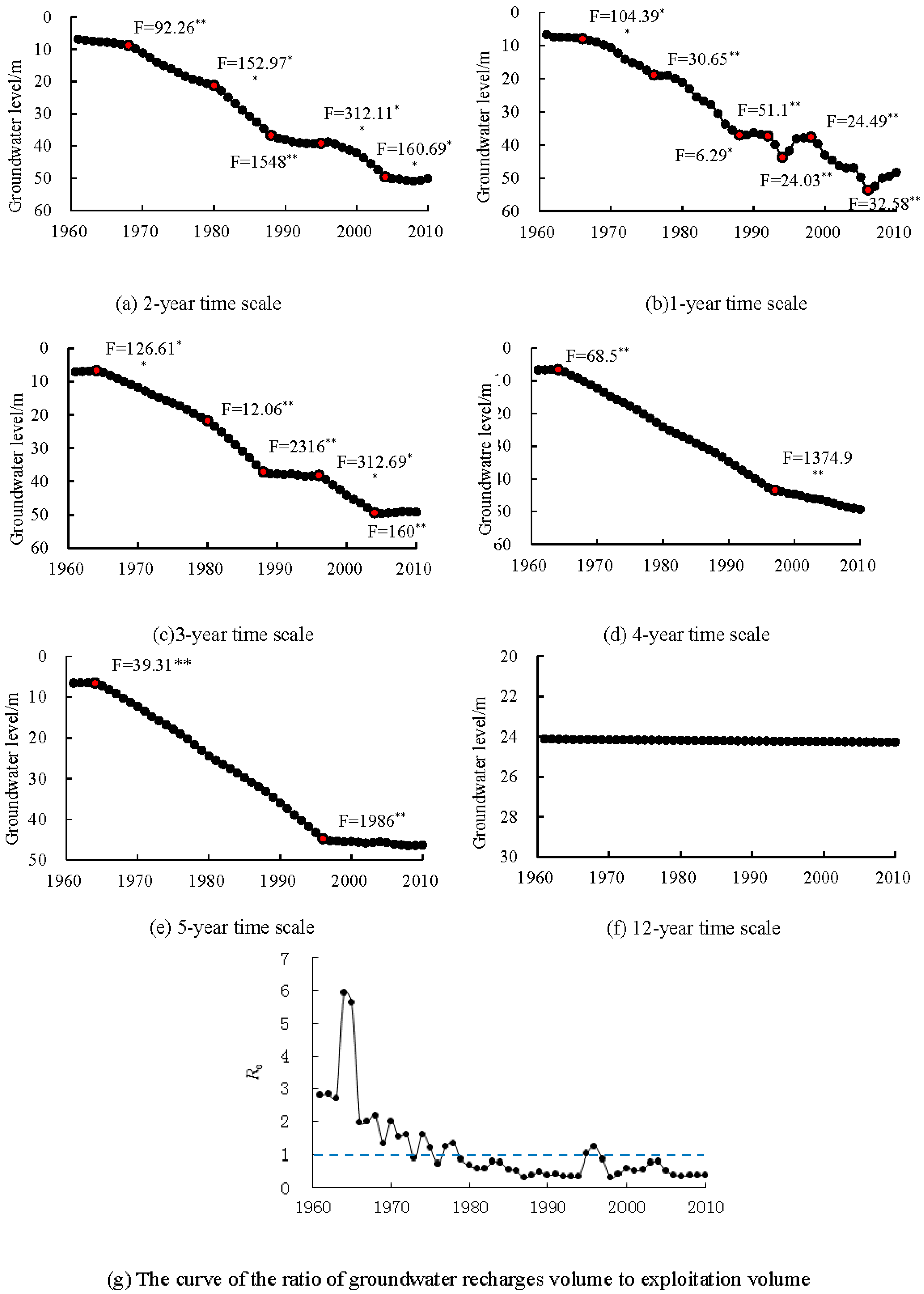
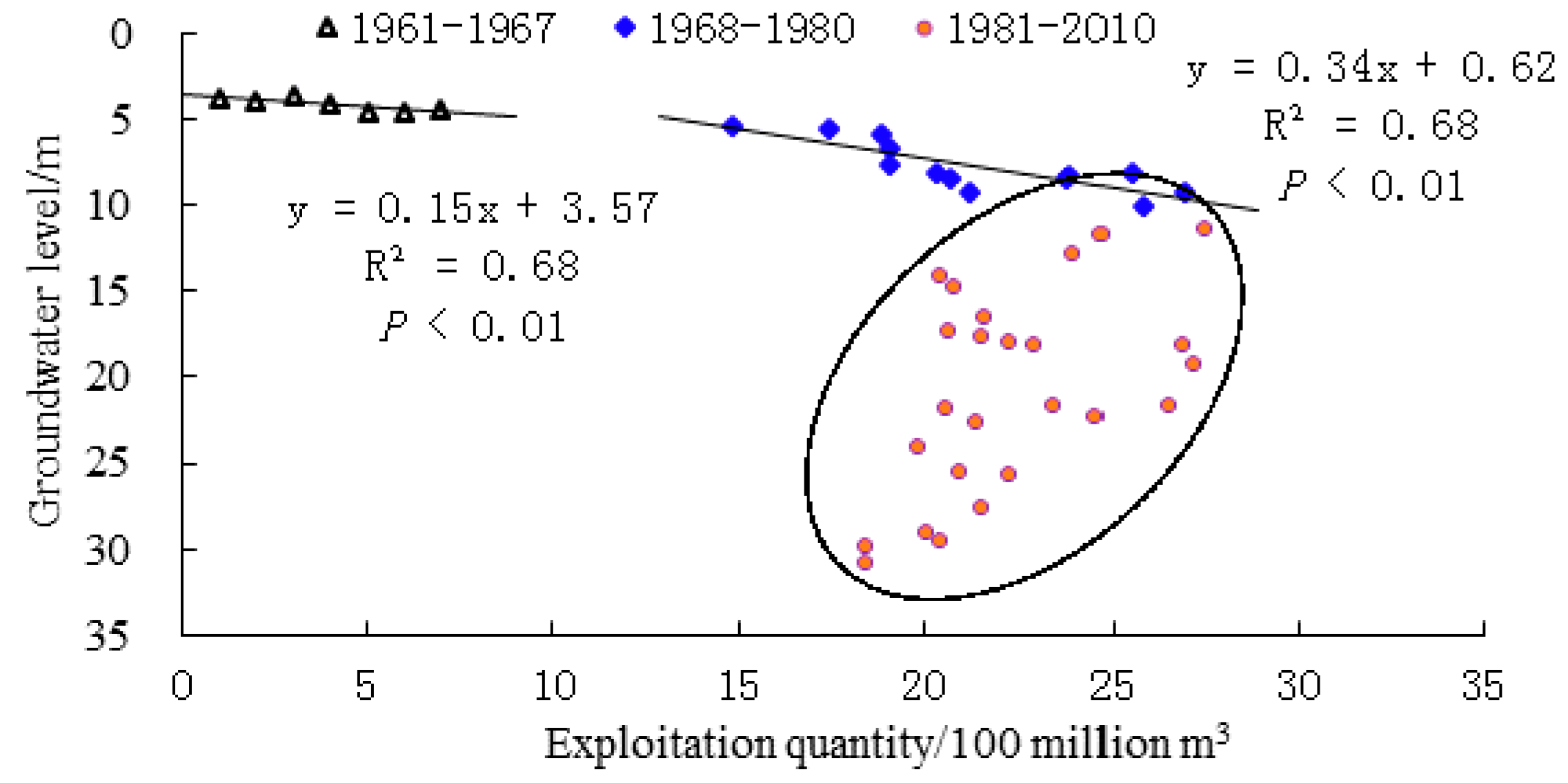
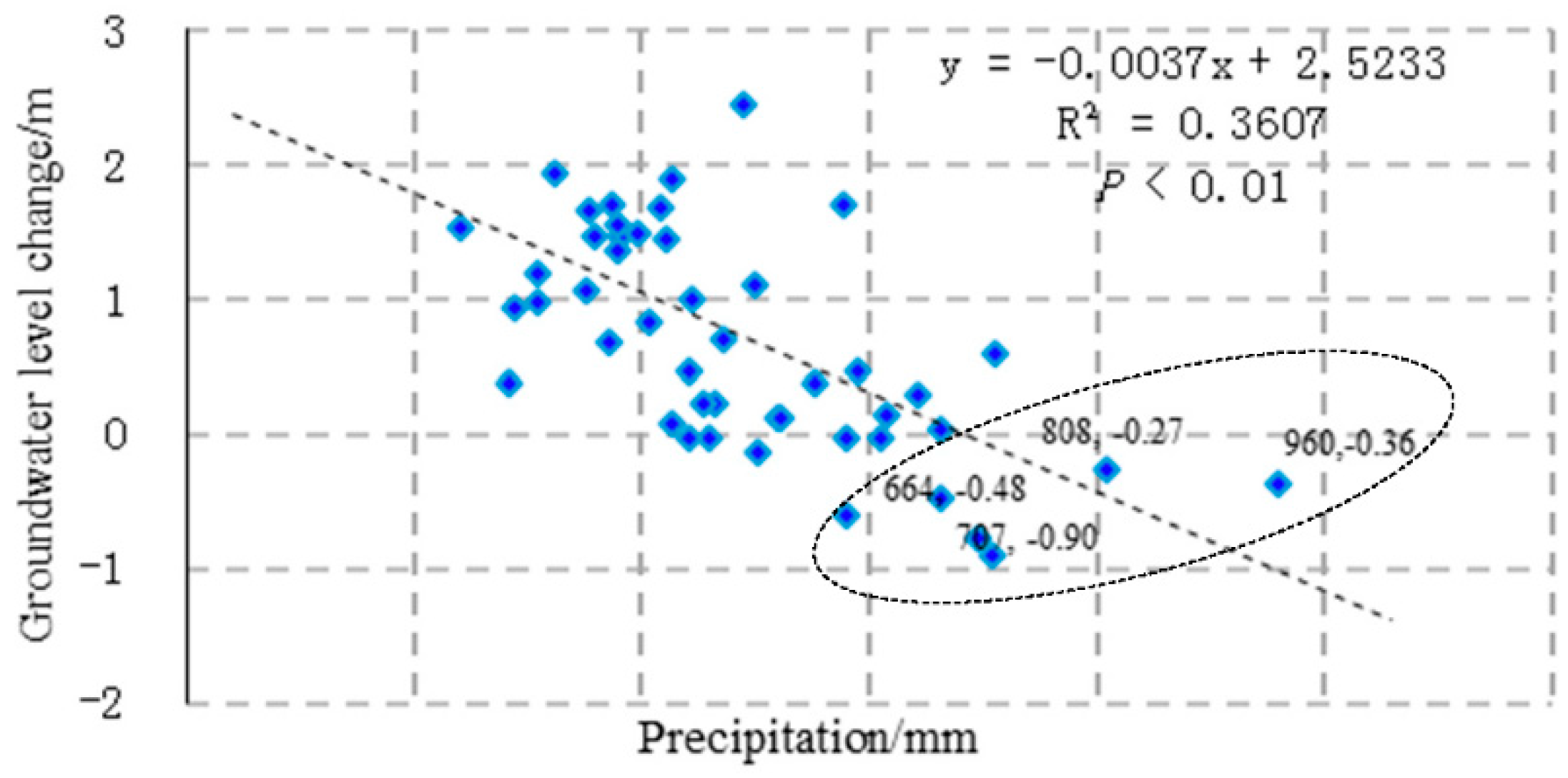
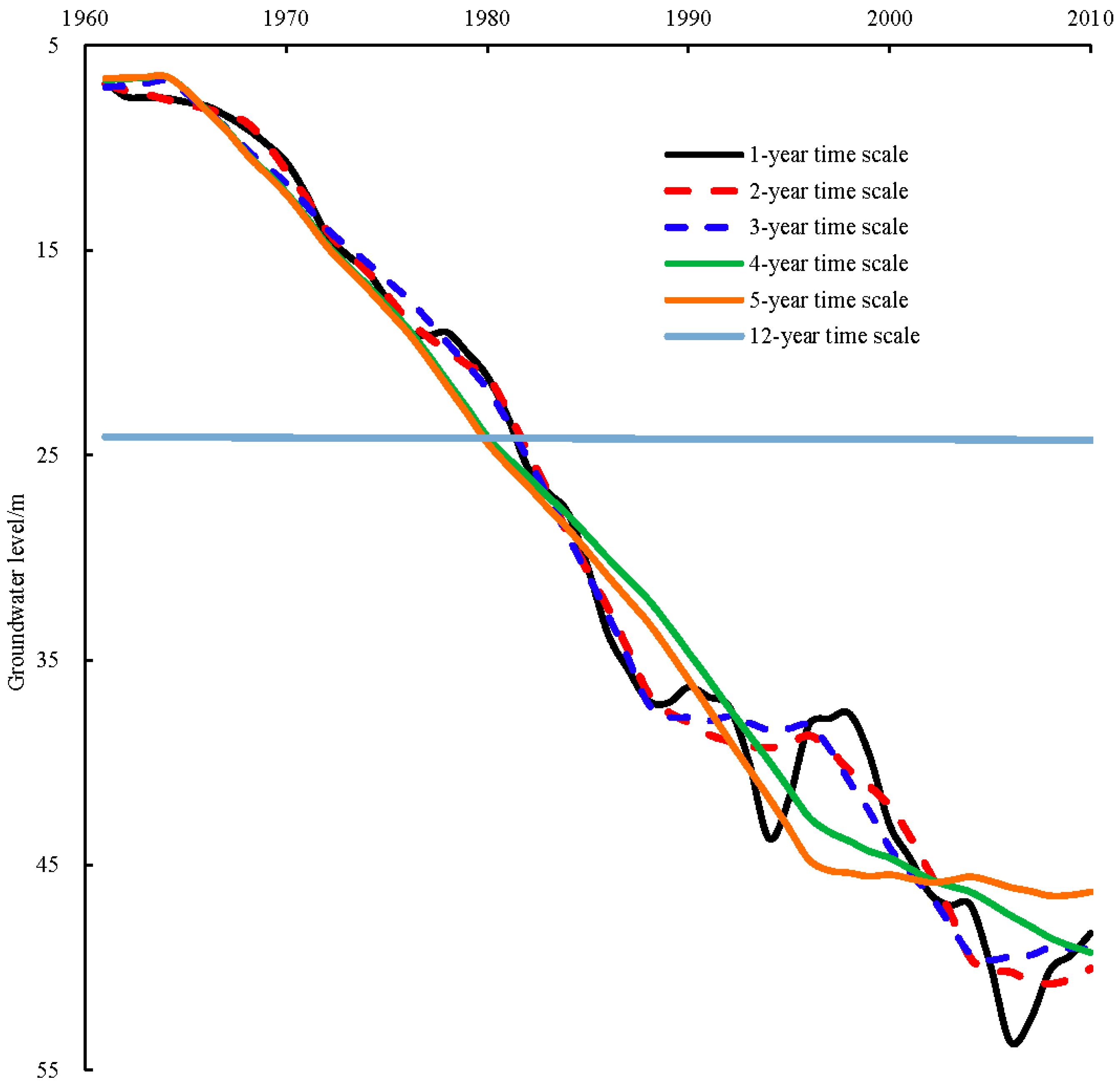
| Decades | Precipitation/mm | Range of Variation/% |
|---|---|---|
| 1951–1960 | 614.2 | 0.00 |
| 1961–1970 | 525.5 | 14.4 |
| 1971–1980 | 467.0 | −24.0 |
| 1981–1990 | 477.5 | −22.3 |
| 1991–2000 | 470.4 | −23.4 |
| 2001–2010 | 472.0 | −23.2 |
| Year | <5 m | 5–10 m | 10–15 m | 15–20 m | 20–25 m | 25–30 m | 30–35 m | 35–40 m | 40–45 m | >45 m |
|---|---|---|---|---|---|---|---|---|---|---|
| 1965 | 7945 | 260 | ||||||||
| 1975 | 791 | 5525 | 1832 | 57 | ||||||
| 1985 | 239 | 1932 | 3788 | 1904 | 252 | 89 | ||||
| 1995 | 62 | 293 | 2011 | 1209 | 2851 | 1386 | 315 | 76 | 2 | |
| 2005 | 18 | 257 | 758 | 1277 | 893 | 908 | 2024 | 1742 | 296 | 30 |
| Equilibrium Elements | Evolution Stage | |||||
|---|---|---|---|---|---|---|
| Natural Flow Field Stage | Mild Overexploitation Stage | Depression Cone Formation Stage | Serious Overexploitation Stage | Exploitation Reduction Stage | ||
| Input fluxes | Infiltration from precipitation | 23.00 | 19.19 | 20.67 | 20.06 | 24.30 |
| Leakage of watercourse | 15.00 | 2.82 | 3.12 | 4.68 | 0.81 | |
| Infiltration from canal system | 11.00 | 9.48 | 3.24 | 2.40 | 1.82 | |
| Infiltration from irrigation | 12.00 | 11.39 | 8.12 | 7.72 | 7.71 | |
| Lateral influx | 10.00 | 8.28 | 8.77 | 6.73 | 5.88 | |
| Subtotal | 71.00 | 51.15 | 43.92 | 41.58 | 40.52 | |
| Output fluxes | Exploitation | 20.00 | 43.45 | 52.24 | 55.96 | 53.47 |
| Lateral outflux | 8.00 | 5.39 | 3.84 | 2.47 | 6.01 | |
| Subtotal | 28.00 | 48.85 | 56.08 | 58.43 | 59.48 | |
© 2018 by the authors. Licensee MDPI, Basel, Switzerland. This article is an open access article distributed under the terms and conditions of the Creative Commons Attribution (CC BY) license (http://creativecommons.org/licenses/by/4.0/).
Share and Cite
Wang, D.; Zhang, G.; Feng, H.; Wang, J.; Tian, Y. An Approach to Study Groundwater Flow Field Evolution Time Scale Effects and Mechanisms. Sustainability 2018, 10, 2972. https://doi.org/10.3390/su10092972
Wang D, Zhang G, Feng H, Wang J, Tian Y. An Approach to Study Groundwater Flow Field Evolution Time Scale Effects and Mechanisms. Sustainability. 2018; 10(9):2972. https://doi.org/10.3390/su10092972
Chicago/Turabian StyleWang, Dianlong, Guanghui Zhang, Huimin Feng, Jinzhe Wang, and Yanliang Tian. 2018. "An Approach to Study Groundwater Flow Field Evolution Time Scale Effects and Mechanisms" Sustainability 10, no. 9: 2972. https://doi.org/10.3390/su10092972
APA StyleWang, D., Zhang, G., Feng, H., Wang, J., & Tian, Y. (2018). An Approach to Study Groundwater Flow Field Evolution Time Scale Effects and Mechanisms. Sustainability, 10(9), 2972. https://doi.org/10.3390/su10092972




